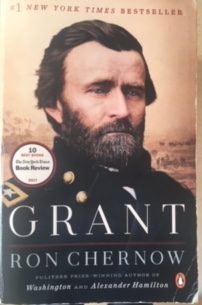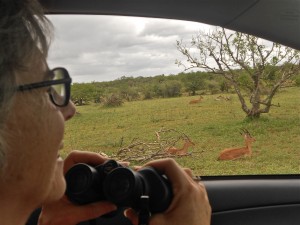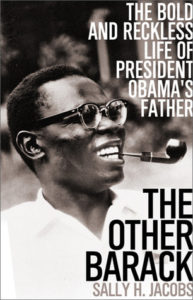
When my son lends me his voluminous biography of our 18th President, Ulysses S. Grant, written by Ron Chernow, Pulitzer Prize winner and author of Hamilton and Washington, I get no further than the very first page when I realize I’m hooked, eager to learn what’s in the 1073 pages remaining.
It’s a bygone era, true, a vastly different life, yet familiar too. Reading about this American president I vaguely recognize from my high school history class, I’m surprised, excited even, to see that here’s someone, strangely enough, I can identify with. Someone I wish I knew.
Historical textbooks have portrayed Ulysses S. Grant’s terms in office as marked by rampant corruption presided over by a president who spoke only on occasion, had an alcohol problem, little charisma, and was simple-mindedly loyal to duplicitous “friends” in politics. Reading GRANT however, I discover a singular, sensitive man born in the Midwest of pioneer stock, the “son of an incorruptible small-town braggart” and a silent, beloved mother, an expert horseman, a failure at business while brilliant at military maneuvers, who resigned from the army in disgrace. A foe of slavery.
The very first sentence introduces me to Grant who has just left the office of the Presidency. It seems Ex-President Grant is unlike so many other presidents who rushed to publish their memoirs as soon as they departed the White House. No, two-time President Ulysses S. Grant, High Military Commander of the Union Army, who defeated the renown Confederate General Robert E Lee to win the Civil War for Abraham Lincoln, “refused to trumpet his accomplishments in print” and was, in fact, too modest and unpretentious. As Chernow describes it, Grant was a hero in spite of himself. He hated boasting about himself and his wartime accomplishments.
By the middle paragraph, Chernow fast-forwards to 1883 in post-Civil War New York City, where Grant, no longer president, has a crippling accident getting out of a taxi on a snowy night and ends up being a lifelong invalid with “excruciating pain” and the “agonizing onset of pleurisy coupled with severe rheumatism.”
And still on Page 1, Chernow hints at the financial success Grant longed for finally being realized at the end of his life. Ex-president Grant has partnered with a young brash swindler, Ferdinand Ward, and imagines himself a millionaire who will be able to at last provide support for his wife Julia after he’s gone. But then . . .and then . . .while. . .after.
Deep into it now, I experience a small, unassuming man who never wanted to go to West Point, who could fall asleep in the middle of a battle and wake up refreshed, and who had the love and loyalty of the huge Union Army of Lincoln. Who Frederick Douglass called, “the protector of my race.” Grant who sought freedom and justice for newly emancipated slaves both as Commander in Chief and later as President, fighting carpetbaggers and the newly formed Ku Klux Klan.
There’s been recent controversy around Julia who grew up in a slave state, in a family with slaves, and Grant keeping one slave, William, for a year, which led to Grant’s statue being toppled in San Francisco. But as I discover on p. 106, “when it came within his power, Grant . . . filed papers, to “hereby manumit, emancipate and set free said William from slavery forever.”
How revelatory and comforting to me to learn intimate details of this far-sighted, faithful, loving husband and father whose lifelong love affair was with his four children and his wife, Julia, a fascinating, vivacious woman in her own right, who flourished even at the very end of what became his torturous life.
You too will want to read more of GRANT by Ron Chernow, the man behind the book, the president of the United States in turbulent times too.



